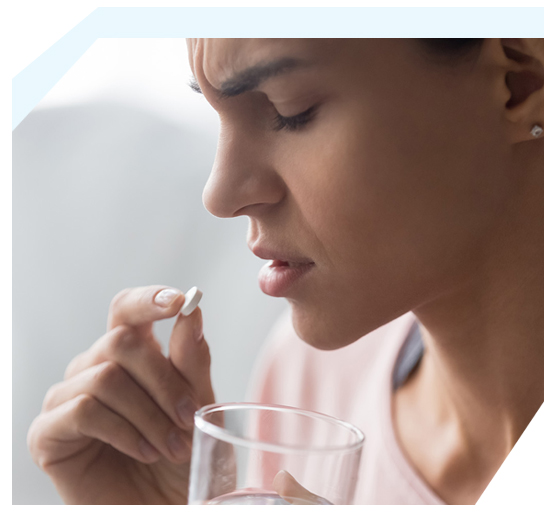Alcohol Detox Near Me
Finding the right alcohol detox treatment center is the first step in a long journey towards a healthy, sober life.
Sometimes it’s hard to tell the difference between someone who is just drinking casually and someone who has a drinking problem. Alcohol is so deeply ingrained into our society that no one thinks too hard about its potential consequences. It’s also a fact that most people who suffer from alcoholism do not receive the treatment that they need.
Some people go from drinking once during social events to drinking three or four times before going to bed. But alcohol abuse isn’t a purely social problem. The condition can develop because of a mix of genetics, opportunity, environment, and other factors.
People who suffer from alcohol use disorder feel like they need to drink in order to feel normal. They have developed a dependence on alcohol and they feel as though they need to drink all the time. If they attempt to quit, they will go through withdrawal and also experience intense cravings, causing them to relapse.
The physical effects of alcohol use disorder make it necessary for addicted individuals to seek medical treatment. Detox in particular is very important in the process of tackling alcohol abuse and its effects.
Although there are no two people who will go through alcoholism in the exact same way, detox is always that necessary first step towards sobriety. This is why choosing the right alcohol detox center is important. It can play a big role in ensuring a patient’s successful recovery.
Choosing an Alcohol Detox Program near Me
When choosing an alcohol detox treatment center, knowing all your options can help you narrow it down to the best fit. A facility can be suitable to one patient but not the other. Everyone has different needs, and treatment centers have different capabilities.
The two most important factors people take into consideration are location and cost. A detox center that’s close to where you live would be the most convenient. The price is also a big concern for a lot of individuals struggling with any type of addiction.
But in order to receive the best possible treatment, other factors need to be considered. Questions you need to ask include:
How long will drug detox take?
What kind of programs do you offer?
Is it an inpatient or outpatient detox program?
How will it fit into your lifestyle, home life, and work?
Does the facility accept your insurance?
It is important to find a reputable program with a well-trained staff and a high success rate. The patient should also be comfortable with the facility and the program they are offering. Remember that detox is just one part of a complete addiction treatment plan. The addiction plan should be personalized according to the patient’s needs. Find out what other treatments they could provide.
If you can’t get recommendations from people you know and trust, you can also read reviews online about how certain facilities conduct their detox programs.
What is Alcohol Detox?
Alcohol detox and rehab are not the same. Detox is just one part of the rehab experience. Rehab or addiction treatment is usually a combination of detox and behavioral therapy that is tailored for a patient’s specific needs and circumstances.
Detox is a natural process that occurs within the body as it attempts to eliminate harmful substances such as alcohol and drugs. In an alcohol detox facility, the patient’s alcohol intake will be reduced gradually while medical professionals and addiction experts keep track of their progress. Their withdrawal symptoms will be monitored and managed. Medications will be given as necessary.
Detox programs are designed to make this natural process as comfortable for the patient as possible. Detox programs can also involve counseling while the patient undergoes medical observation. Some facilities provide both detox and behavioral therapy, while others are just focused on detox.
People who have been abusing alcohol for a long time are likely to experience withdrawal during detox, and some of its effects can be dangerous. That’s why supervision from health care experts is important. Some people try to detox by themselves but only end up relapsing or putting themselves at risk. A proper detox program will restore them to a healthy state while reducing risk of relapse.


How to Detox From Alcohol: Medically Supervised Detox
Alcohol detox can be considered a “preparatory step” before an intensive treatment program. While detox can be done safely in both inpatient and outpatient settings, round-the-clock monitoring is recommended, especially for those who are heavy drinkers.
While the exact approach may vary depending on the patient’s condition, detox usually involves three steps: intake, medication, and stabilization.
Intake is the part where the patient undergoes a series of tests and interviews that are designed to flesh out their medical and psychiatric histories. This is a comprehensive view of their condition that allows health care providers to create an appropriate treatment plan.
Medication is often used in many detox programs because they either mitigate withdrawal symptoms or reduce the patient’s cravings. Either way, they can make the detox process more comfortable for the patient. Medical professionals can administer them as necessary and still keep track of the patient’s withdrawal symptoms. Oftentimes, medications are used to deal with co-occurring disorders.
Finally, the process of stabilization is all about rebalancing the patient’s physical and mental health through therapies. Detoxing from alcohol is an unpleasant process and it takes a lot of readjustment.
Substance Abuse Treatment Options for People with AUD
Aside from detox, there are plenty of other alcohol treatment programs and addiction treatment services offered in various American addiction centers. There is no one size fits all solution. Treatment programs may vary in terms of their effectiveness, and it all depends on the person’s situation and goals.
Just like drug abuse, alcohol abuse can affect people in different ways. This is why the treatment process will vary from one person to another. As you look into various alcohol rehab centers, you may find that these rehab facilities offer different kinds of programs that address various needs. A rehab center may even specialize in treating specific symptoms or certain demographics.
A lot of these substance abuse services are evidence-based therapies for people suffering from alcoholism. In some cases a combination of various methods can work best for a certain patient.
Psychotherapy is the classic approach to alcohol treatment. Someone who is seeking addiction treatment may be thinking about psychotherapy, wherein they are treated by a trained psychologist who can help them navigate their behaviors and thought processes by talking about their experiences and problems. Also known as talk therapy, this treatment works best when paired with a detox program.
Psychotherapy can be done in a one-to-one, group, or family setting. The therapist, counselor, or psychologist can discuss the person’s long-standing issues, daily struggles, and past traumas. By diving deep into the patient’s psychological state, they can better understand why that person is abusing alcohol the way they are. They can also help the patient come to that realization and begin working towards making healthier choices.
This type of treatment process also helps the patient establish their motivations so that they can stay sober for the long term. They will learn to manage their cravings through healthy coping mechanisms and replace drinking with more productive activities.
Psychotherapy sessions can last from weeks to a couple of months. During this time, the patient and the psychologist will develop a relationship based on confidentiality, openness, and trust.
Psychotherapy is a broad term. When you do your research online and look up rehab options for alcohol addiction, you will find many different kinds of psychotherapy. If you search for things like “American addiction centers photo” or “American addiction centers logo” you will find many rehab centers that offer a wide range of psychotherapy programs. There’s Cognitive Behavioral Therapy, Dialectical Behavioral Therapy (DBT), motivational interviewing, and many other behavioral therapies.
Cognitive Behavioral Therapy is all about identifying negative thoughts and behaviors, allowing patients to replace them with more positive alternatives. As a form of psychotherapy, it involves talking to a therapist and having a solutions-oriented approach to treatment. This should help identify all the reasons why a person is drinking as much as they are. It also teaches them how to channel that energy into something beneficial rather than self-destructive. This treatment can be effective in as few as five treatment sessions.
A rehab program may also employ Dialectical Behavioral Therapy or DBT. It is another form of talk therapy, but it operates under the assumption that everything in the world is connected. This means every challenge that a person face may synthesize into some greater truth. It takes a more philosophical approach to treatment. It teaches patients to move forward with their lives rather than dwelling on the past or feeling guilty about their mistakes. DBT aims to guide patients towards making positive changes in their lives.
Motivational Interviewing or MI is a method that encourages patients to set goals for self-improvement. As the name suggests, it is a technique that seeks to motivate patients. Drug and alcohol addiction can make a person’s life feel chaotic and out of control. This is why drug addiction treatment and alcohol treatment are designed to restore that balance and help patients get that sense of control back. This will give them the willpower to take action against their current situation.
A therapist gives a motivational interview to encourage patients to commit to these changes, and that includes saying goodbye to alcohol.
Alcohol detox centers can also introduce a social element to the treatment process. Humans are social creatures, and a lot of patients in drug rehab centers respond positively to getting emotional support from others. This is why 12-step programs are so popular.
Addicted individuals and alcoholics often feel alone or isolated because of their condition. But a 12-step program offers community support from people who understand your situation and what you are going through. Alcoholics Anonymous is the most famous version of this. There are also 12-step programs for other types of drug abuse such as cocaine, heroin, prescription opioids, etc. The support patients receive from 12-step programs can easily translate to long-term success and sobriety.
On top of these behavioral therapies, patients can also go through alternative treatments such as yoga, meditation, art therapy, music therapy, dance therapy, equine therapy, etc.
There are inpatient and outpatient options for medical detox and other treatment programs. Some patients start with residential rehab and then switch to an outpatient program once they have made significant progress towards their sobriety.
Start looking for alcohol treatment programs near you today. There are many factors to consider, so you may be overwhelmed by the number of choices. But you can narrow down your choices by considering certain factors.
First, you want to look into the location of the alcohol rehab center. When it comes to American addiction centers location is very important. Most patients benefit from being in close proximity to the alcohol rehab center, especially those who are in outpatient programs since they will be driving back and forth as they receive treatment. Even if it is an inpatient detox program, you still want to browse rehab centers that are close by so that friends and family can visit any time.
On the other hand, some patients benefit more from being far away from their toxic environment, so you may look into alcohol treatment centers that are a bit farther away so that they can focus on the recovery process.
Location is perhaps the most important factor to consider, but when choosing addiction treatment facilities, you also need to look into other things like what programs they offer and what they specialize in.
How does the facility handle the withdrawal process? Is it an inpatient or outpatient program? What is their success rate? How do they deal with a medical emergency?
Also look into the various rules and regulations within the alcohol rehab facility. Look into the details including staff certification, cell phone usage, message and data rates, visitation hours, insurance coverage, etc.
After narrowing down your choices, start visiting these different drug and alcohol detox centers and see for yourself which is the best fit for you or your loved one. Visiting a rehab facility will help you learn more about their alcohol and drug detox program. This will help you make a decision. They may even have recommendations for you based on the patient’s condition. Seek treatment for alcohol use disorder today.


Alcohol Abuse Symptoms
“Alcoholism”, “alcohol addiction”, “alcohol abuse”, and “alcohol dependence”—it goes by many names, but it’s not always easy to identify an alcohol use disorder. Some people wonder if they have a drinking problem. Knowing the signs and symptoms can help family members spot unhealthy habits before they develop into something more dangerous.
If a person drinks more than they plan to in a given situation, it may be a sign of uncontrollable alcohol intake. Either they drink more than usual or drink for longer than they said they would. Maybe they have tried to cut back on their drinking before but failed repeatedly. Or maybe they spend a lot of time drinking, thinking about drinking, or being sick and hung over. These are signs of alcohol abuse.
Since addiction is characterized by the compulsive use of alcohol despite suffering from its consequences, the person will keep drinking even if it’s already causing them problems. They will spend a lot of time craving for alcohol, eventually losing interest in things they used to find enjoyable and neglecting their responsibilities. They may want alcohol so badly that they can’t think about anything else.
Someone who is addicted to alcohol will drink even if it makes them depressed or anxious. They will often drink until they lose consciousness. Because of their constant intake of alcohol, eventually they have to start drinking more just to experience the euphoric effects that they want.
Having withdrawal symptoms every time the person stops drinking is another clear indication of alcohol abuse. Common symptoms of withdrawal include nausea, vomiting, sweating, insomnia, shakiness, restlessness, seizures, and hallucinations. These symptoms can occur a few hours after quitting alcohol or right after the buzz wears off.
Alcohol use disorder isn’t just about how much a person drinks, but also about how often they drink, what they drink, and how it affects them whenever they cut back on their drinking habits.
Medications Typically Used During Alcohol Detox
Part of maintaining the balance within the patient’s system during detox is avoiding major health problems. Sometimes medications are required because of this.
During alcohol treatment, medications like benzodiazepines are used. Drugs like Librium, Valium, and Ativan can reduce withdrawal symptoms caused by alcohol use. These benzodiazepines can even prevent seizures caused by withdrawal.
When it comes to alcohol withdrawal, seizures are among the most common causes of fatality. Additional anticonvulsant drugs may also be used.
It is worth noting that benzodiazepines should only be taken under prescribed doses in order to control the effects of withdrawal. Benzodiazepines are addictive substances in their own right, and should not be misused by addicted individuals. Its usage is closely monitored in detox settings.

How Long Does Alcohol Detox Take?
Detox can begin within hours of discontinuing a drinking session. Unfortunately, this means withdrawal can also set in at that point. During the detox process, people will experience withdrawal in different ways. One person’s symptoms will not be the same as another person’s.
People who have been drinking for a long time may experience severe withdrawal symptoms. The same goes for those who have had withdrawals before, and those who have been drinking heavily. Withdrawal may also have intense effects on people with co-occurring health issues.
Alcohol withdrawal typically occurs within 8 hours after the last drink, but in some cases, it occurs days later. The symptoms will peak by 24 to 72 hours, but they may persist for weeks.
Alcohol withdrawal has three stages: stage 1, stage 2, and stage 3. The first stage refers to the first 6 to 12 hours, while the second stage refers to the following 12 to 48 hours. Stage 3 refers to the last 48 to 72 hours.
Withdrawal occurs because the brain and body go into shock when deprived of the substance they have become dependent upon. So for someone who has been abusing alcohol for a long time, withdrawal is to be expected.
While there is no exact timeline for how long alcohol detox will last, it will be influenced by a number of factors such as age, weight, metabolism, gender, drinking habits, and co-occurring disorders.
Medications for Percocet Detox
The detox process is often done with the assistance of medications. Medications can keep withdrawal symptoms and cravings under control, which makes the process a lot more comfortable for the patient.
Some of the medications used for Percocet detox are methadone, buprenorphine, and naltrexone.
Methadone is an agonist drug that helps lessen the cravings for Percocet. It also reduces the effects of withdrawal. Similarly, buprenorphine can be used to reduce cravings and withdrawal symptoms.
Naltrexone can block the high caused by Percocet so that it does not cause the same euphoric sensation that keeps the patient addicted. Like methadone and buprenorphine, this can help lessen the cravings for Percocet. LEARN MORE
Finding Alcohol Detox Programs near Me
Because of the dangers of withdrawal, it is important to seek medical attention for a loved one who is trying to get sober. Attempting to self-detox can be dangerous, and death is a likely outcome if Delirium Tremens is present.
There is also a kindling effect that can happen if withdrawal is not addressed right away. This can lead to even worse withdrawal symptoms later. Consulting with a medical professional can make alcohol detox a lot safer. It will serve as the first step in a comprehensive treatment program, and it will get the patient started on the path towards sobriety.
Aside from dealing with the physical effects of addiction, it is also important to get to the root cause of addictive behavior. That’s how you maintain sobriety in the long-term.
Start looking for alcohol detox programs nearby and find out what kind of programs they offer. Once you have a list of prospective facilities, you can compare them and see which one is the best fit for you or your loved one.
How Much Does Alcohol Detox Cost?
The cost of detox depends on a number of factors including insurance coverage, location, amenities, and type of addiction. The programs offered may also affect the cost of detox. Inpatient alcohol detox is generally more expensive than outpatient detox, for example.
Inpatient detox involves staying in a detox facility for the duration of the treatment program. Food, medications, and accommodations are provided which is why it is generally pricier.
On the other hand, outpatient treatment is more affordable and it allows the patient to go home in between treatment sessions. It involves traveling back and forth to the treatment facility, but it allows patients to keep up with their responsibilities outside of rehab. While it is less structured than an inpatient program, it can still work for people with milder cases.
In general, outpatient care is less expensive, but inpatient care may be more effective for a lot of people.
Alcohol is one of the substances that can cause unpleasant withdrawal symptoms during detox. It’s better to have round-the-clock care from trained health care professionals.
For residential care, it may cost $500 to $650 per day. Partial hospitalization can cost $350 to $450 per day. Outpatient treatment can cost $250 to $350 per day. Again, the cost will vary greatly depending on a number of factors.
Even without insurance, there are different payment plans that can help make addiction treatment more affordable and accessible for those who need it. Taking out a loan can also be a good idea for some people. The long term financial impact of alcohol abuse is far more severe than seeking addiction treatment. Think of it as an investment towards a healthier future.
Does Insurance Cover Alcohol Detox?
It’s a good idea to verify your insurance benefits to see what and how much it can cover. Contact your insurance provider to see if it covers detox programs. Insurance may cover inpatient rehab, outpatient rehab, and other additional services for the treatment of substance use disorders. Most policies offer at least partial coverage. However, exclusions also exist, so it’s important to clear that up.
A lot of rehab centers even have insurance specialists on board who can help clients navigate the specifics of their policies. So either contact them or speak with your insurance provider directly to know about the specifics of your coverage.
Withdrawal Symptoms Caused by Detox: Delirium Tremens
Medically-assisted detox can limit some of the negative effects of withdrawal, however, some of them are unavoidable. Delirium tremens or DTs is one of the most dangerous effects of alcohol withdrawal. It can happen when a person stops drinking after a long period of abuse. Delirium tremens can be fatal in 1 to 5 percent of cases.
Some patients have a bigger risk of experiencing delirium tremens, particularly older patients and those with a history of heavy alcohol use. This condition requires immediate medical attention.
Symptoms of delirium tremens include fever, hand tremors, dilated pupils, high body temperature, rapid breathing, seizures, hallucinations, and extreme agitation or confusion. According to the Substance Abuse and Mental Health Services Administration (SAMHSA), 3 to 5 percent of people who detox go through delirium tremens.
Aside from delirium tremens, there are other withdrawal symptoms that occur during different phases of detox. Phase 1 of detox happens within hours of ceasing consumption of alcohol. It continues for days or even weeks. This is when most of the severe side effects set in such as anxiety, convulsions, tremors, nausea, vomiting, shakiness, insomnia, hallucinations, hypertension, and heart failure.
The second phase of alcohol detox is longer and refers to the early stages of abstinence. Over the months, the brain will slowly get back to normal functioning. Withdrawal symptoms may still occur, including anxiety, restlessness, insomnia, mood swings, reduced appetite, and depression.
Detoxing alone is dangerous, especially in long-term alcohol abusers. Detoxing “cold turkey” can even lead to fatal results. That’s why it’s important to seek proper medical attention. Look for an alcohol detox center near you and find out what programs they offer.
Remember that after detox, the patient still needs to go through therapy so that they can learn proper coping mechanisms that will keep them sober. Addressing the root cause of addiction is just as important as managing withdrawal symptoms. That’s why a combination of detox and behavioral therapy is recommended. Get started on your journey towards sobriety today.

